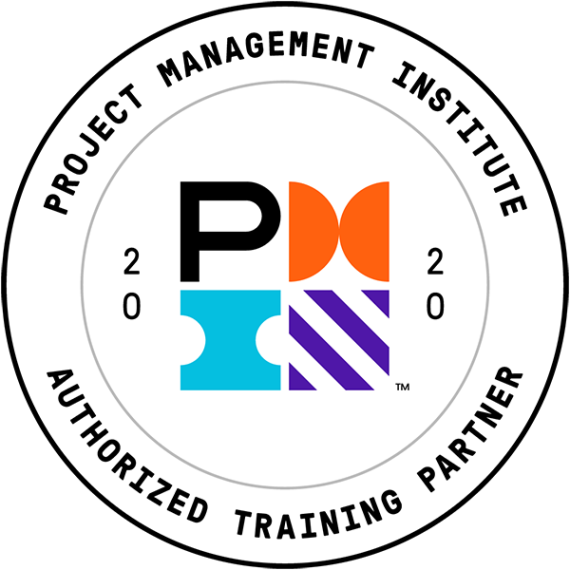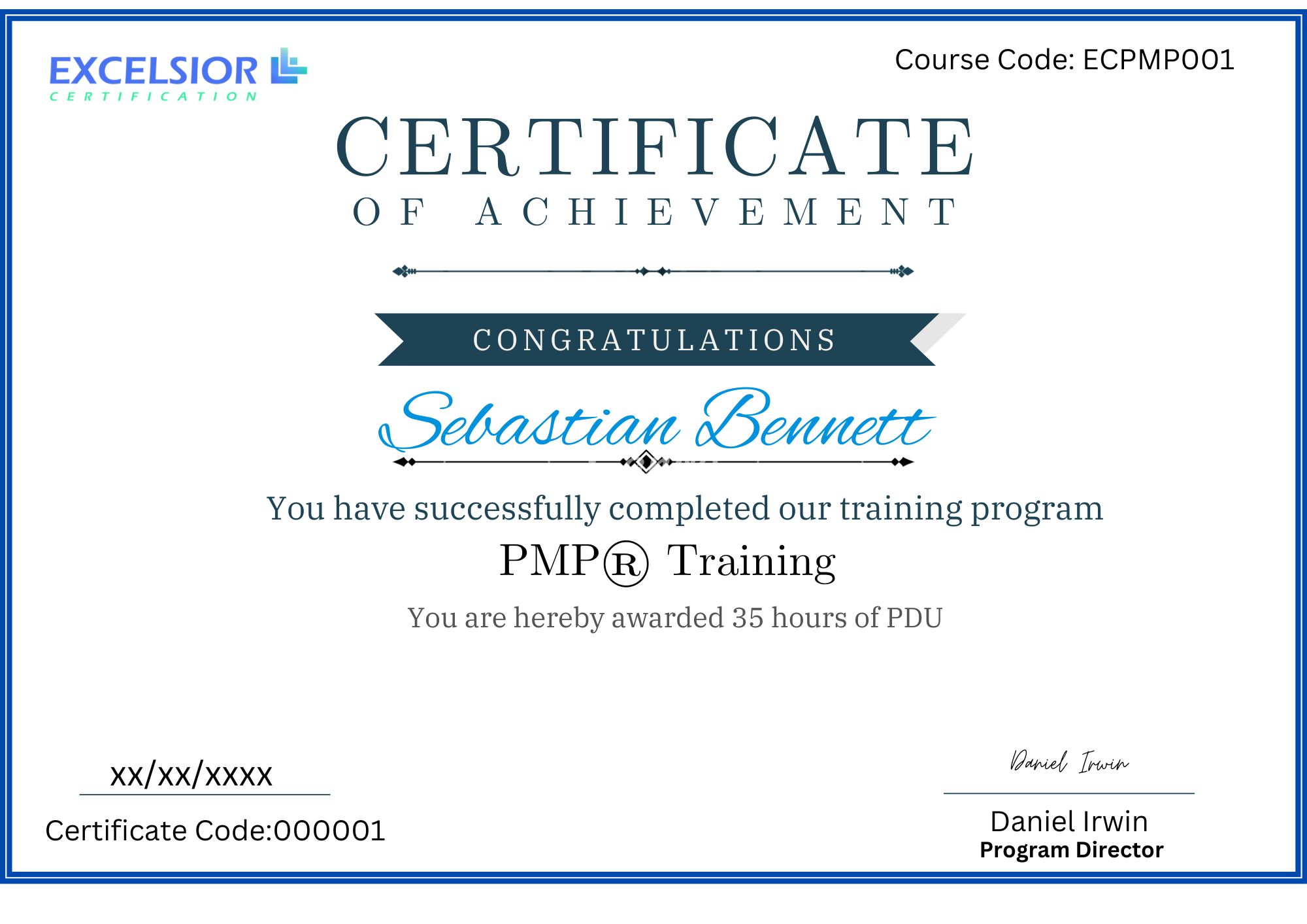PMP® Certification Training
Key Features
- 4-days (8 hours/day) intensive program by Expert Trainers
- 35 Contact Hours (35 PDUs) Certificate
- Classroom training/ Instructor- Led online training available
- Weekend /Weekday classes available
- Comprehensive PMP Exam Prep Class
- 2000+ PMP exam prep practice questions
- 5 full-length PMP practice exams
- Lifetime access to PMP E-learning worth $499
- PMP Program Handbook based on PMBOK Guide - 7th Edition
- Executive support with PMP Exam Application Process

Project management Institute
TRAINING MODE
E-LEARNING
$499
- PMP 180 days e-Learning
- Self paced online e-learning
- Interactive audio-video lessons
- Online Exam Simulator
- ebook and study materials
- 24x7 Online access
- Earn 35 PMI PDU's
Live Online & Classroom Training
$999
- 90 days of flexible access to online, classroom classes
- Live, online classroom training by certified instructor & Practitioners
Class starts from:-
- 16 Nov - Weekend Class
- 19 Nov - Weekday Class
CORPORATE TRAINING
- Customized learning delivery model (digital material and/or instructor-led)
- Flexible pricing options
- Enterprise grade Learning Management System (LMS)
- Enterprise dashboards for individuals and teams
- 24x7 learner assistance and support
PMP TRAINING COURSE DESCRIPTION
PMP® course is one of the most in-demand certifications for management professionals. The course is in high demand, and one can gain plenty of benefits by undertaking this certification. Its reach is global and serves as one of the most reputed & recognized project management certifications worldwide.
Both employees and employers can make the most of this certification as employees can get higher remuneration than the non-PMP certified managers. Also, through an exhaustive certification process, it is possible to achieve the knowledge and expertise to deal with complex projects. PMP® helps individuals connect with more people across companies, verticals, and geographical locations. Certification provides ample exposure to an individual in strengthening communication, leadership qualities, ability to solve problems quicker, developing critical thinking, and finally, risk management skills.
The course structure is as per PMI- Project Management Institute Guideline with a guide to providing knowledge of the project management body (PMBOK 7TH Edition). The professional trains you on the project lifecycle, 5 project management phases, 10 knowledge areas, and 49 processes aligned with a guide providing knowledge on the project management body (PMBOK Guide Seventh Edition). The course will also equip you with the functional understanding and business insights to lead and manage projects effectively.
- Gain knowledge of Project Management based on the PMBOK® Guide - 7th Edition and real-life Project Management practices
- Know how to use the tools and techniques you learned while studying for the PMP® exam
- Apply Project Management techniques useful in the real world
- Share common lexicon of Project Management terms and principles
- Apply project management terminologies and concepts
- Lead Provide faster solutions to clients and ensure open communication between stakeholders and team members
- Lead and motivate the team to perform better
- Ensure compliance, reduce risk factors and save on time and costs
- Attempt a first-time pass of PMI's Project Management Professional (PMP)® Certification Exam
- Study PMBOK® Guide's five process groups, ten knowledge areas, and the area of professional and social responsibility
PMP TRAINING COURSE AGENDA
Course Overview
We conduct a PMP training program based on the Project Management Institute’s “A Guide to the Project Management Body of Knowledge” (PMBOK® Guide 7th Edition). Professionals will train you about the project lifecycle, process groups, and knowledge areas and equip you with the functional knowledge and business insights to lead and manage projects effectively.
Our 4-day PMP training program will fully prepare you to pass your PMP certification exam and give you in-depth knowledge about the various and best Project Management best practices.
BENEFITS OF PMP CERTIFICATION
At the end of this course, you will:
- Gain the skills and knowledge of Project Management based on the PMBOK® Guide – 7th Edition and real-life Project Management practices
- Know how to use the tools and techniques you learned while studying for the PMP exam
- Apply Project Management techniques useful in the real world
- Share a common lexicon of Project Management terms and principles
- Contribute to Higher Billing rates and Better Job
- Open Doors to New Clients
- Gain International Recognition
- Establish Credibility
Day 1:
Introduction to Project Management Professional (PMP) Certification
Overview of PMP certification requirements and exam format
Benefits of PMP certification for career advancement
Introduction to the PMBOK (Project Management Body of Knowledge) Guide
Project Management Framework
Understanding the project management lifecycle
Key project management concepts and terminology
Roles and responsibilities of a project manager
Project Integration Management
Developing a project charter
Creating a project management plan
Directing and managing project work
Day 2:
Project Scope Management
Defining project scope and requirements
Creating a work breakdown structure (WBS)
Scope verification and control
Project Schedule Management
Developing a project schedule using network diagrams
Estimating activity durations and dependencies
Schedule compression techniques and schedule control
Project Cost Management
Estimating project costs
Determining the project budget
Cost control and earned value management
Day 3:
Project Quality Management
Planning for quality management
Performing quality assurance and control
Quality management tools and techniques
Project Resource Management
Identifying project resources
Acquiring and developing project team members
Managing and controlling project resources
Project Communications Management
Planning project communications
Managing project stakeholder expectations
Communication channels and techniques
Day 4:
Project Risk Management
Identifying and assessing project risks
Developing risk response strategies
Monitoring and controlling project risks
Project Procurement Management
Planning for project procurements
Conducting the procurement process
Administering procurement contracts
Project Stakeholder Management
Identifying and analyzing project stakeholders
Developing stakeholder engagement strategies
Managing stakeholder expectations and communication
PMP Exam Preparation
Review of key exam topics and concepts
Test-taking strategies and tips
Practice questions and quizzes
Discussion of sample case studies and scenarios
PMP Exam Application Process
Guidance on completing the PMP exam application
Understanding the audit process and exam scheduling
Final tips for exam success
EXAM & CERTIFICATION
The eligibility requirements for PMP® certification are:
Education
Project Management Experience
Project Management Education
Nongraduates
5 years/7500 hours
35 hours
Graduates
3 years/4500 hours
35 hours
Step 1: You need to fill in the PMP application with the relevant information about your work experience.
Step 2: Once the application you can schedule your test anytime as per your convenience within one year
Step 3: You need to complete test of 4-hour duration, consists of 200 multiple-choice questions.
In the past, PMI® had published 61% of 200 questions as the passing score. But now, PMI does not disclose the exact passing score or percentage anymore. After the PMP® Certification Exam update, the passing score is different for every candidate, based on the difficulty level of questions attempted by each candidate.
Start by confirming whether you fall under the eligibility criteria to qualify for the PMP certification examination. Ensure the information filled is correct and relevant. Once submitted, you cannot make any corrections. Hence, take time, inspect, and edit before you submit. Once you are fully confident about the correctness of the information, apply. The email you mention is critical as this will be the only point of contact for the PMI® to reach out to you. PMI® will post your reminders about necessary information to be communicated. You will have to schedule the examination within one year after the approval of your application. Our trainer will help you in filling up your application over the class.
It's subjective and depends much on the audit process. Usually, it takes approximately four working days to process and approve the application. In case PMI® decides to audit, the duration for approval might stretch.
Your manager or supervisor possessing the recommended experience can endorse your project experience.
Postal mail or express courier service is the most preferred means to post the requested audited documents to the PMI®'s official address. Kindly post all the required documents in a single envelope and avoid multiple posts. Please note that PMI® will not accept documents sent through fax machines or emails.
In case of a failed audit, the certification fee (minus a processing fee) is refundable. The Certification Department will take further action on a case-by-case basis. If you fail the PMP® application audit, the PMI® will deduct $100 from your application fee, and you will receive a refund of the remaining fees paid.
You need to pay the exam application fees during submission. The Audit is at the discretion of PMI and happens during the processing of the applicant's documentation.
You can make as many as three attempts in one calendar year as allowed by PMI®.
Usually, it takes about 4 to 6 weeks to receive the certificate from the date of passing the exam.
We hold a passing rate of 98.6% on the first attempt.
Each PMP® certification cycle lasts for three years, during which you will need to earn 60 PDUs (Professional Development Units) to renew your certification at the end of the certification cycle.

OUR ADVISORS


FAQs
The eligibility requirements for PMP® certification are:
Education
Project Management Experience
Project Management Education
Nongraduates
5 years/7500 hours
35 hours
Graduates
3 years/4500 hours
35 hours
| PMI Member Status | USD Fee |
|---|---|
| Non-member | USD 555 |
| Member | USD 405 |
The PMP certification course includes:
- Assistance in the application process
- Access to our e-learning content
- Practice simulation tests
- Tips and tricks videos that help you tackle the tough PMP Certification exam questions
- Online participant handbook with cross-references to the e-learning content
- Chapter end quizzes
- Free exam prep questions
The new PMP Certification exam domains are updated to include more diverse skills and approaches.
The new PMP Certification exam will focus on three domains:
- People - focusing on skills and activities associated with effectively leading a project team
- Process - reinforcing the technical aspects of managing a project
- Business Environment - focusing on the connection between projects and organizational strategy
- The new content will also include predictive, agile, and hybrid approaches in the exam.
For more detail, please refer to PMP exam updates by PMI.
Your manager or supervisor possessing the recommended experience can endorse your project experience.
Postal mail or express courier service is the most preferred means to post the requested audited documents to the PMI®'s official address. Kindly post all the required documents in a single envelope and avoid multiple posts. Please note that PMI® will not accept documents sent through fax machines or emails.
In case of a failed audit, the certification fee (minus a processing fee) is refundable. The Certification Department will take further action on a case-by-case basis. If you fail the PMP® application audit, the PMI® will deduct $100 from your application fee, and you will receive a refund of the remaining fees paid.
You need to pay the exam application fees during submission. The Audit is at the discretion of PMI and happens during the processing of the applicant's documentation.
STUDENT EXPERIENCES






